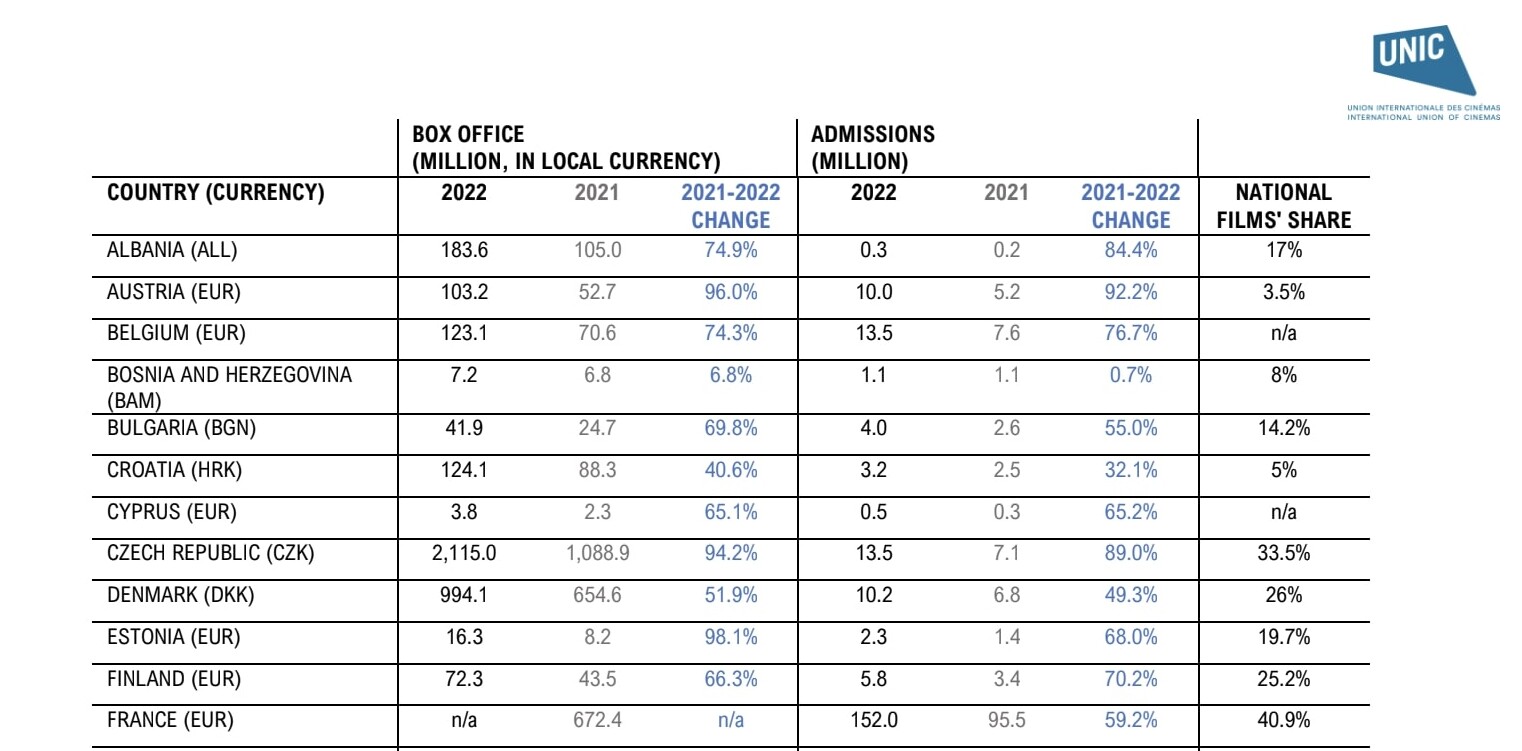
International cinema trade body UNIC has published its preliminary estimates for 2022 box office and admissions across the territories that it covers. The figures show a significant recovery across all countries compared to the Covid lows of 2020 and 2021, even if most countries have yet to see a return to the cinema figures seen between 2017 and 2019. Overall admissions grew by at least 36.5% and total box office for the year is expected to exceed €5.6 billion, once figures are finalised, representing an increase of 55.6% in Europe compared with 2021.
UNIC traditionally releases preliminary 2022 figures ahead of the Berlin Film Festival in February and publishes detailed and final figures in time for the Cannes Film Festival in May. This data is collected from national film bodies and other sources. While the 2022 figures demonstrate a strong and positive trend overall, they show that the European market still has some way to go to match the figures of the pre-Covid record year 2019. Fewer US titles, Covid restrictions in some markets until June and the impact of Russia’s war in Ukraine all depressed the European cinema market in 2022, even as it grew.
Admission figures for Europe are down 40.3% and box office was around 34.4% lower than 2019. Broken down across the EU and UK, admissions and box office were estimated to be 35.1% and 30.8% respectively below the same figures for 2019, with the EU primarily counting tickets sold, while the UK focuses on money earned by cinemas. The differences can most likely be explained by more premium spend in the UK, with admissions probably closer to the EU average.
“The figures clearly show that European cinemas are on the road to full recovery,” said UNIC CEO Laura Houlgatte. “A constant supply of new and diverse titles will be crucial for continuing to drive box office and admissions forward in 2023,” she noted in a statement accompanying the figures. The early figures for 2023 are also encouraging. “In January 2023, the EMEA region recorded the highest-grossing month since the same month in 2020, with box office revenue at approximately €821 million,” according to the press release.
Success stories included the many national Cinema Days across Europes, which boosted admissions. Notably:
- France – over 3.2 million admissions for the Fête du Cinéma, placing 4% above the average admissions for the three previous pre-pandemic editions;
- Germany – the first ever Kinofest saw close to 1.1 million tickets sold, making it the best weekend performance of 2022;
- Italy – in excess of 1.13 million admissions for the first Cinema in Festa, up 123% on the same weekend in 2021 and also a 317% increase on the previous weekend;
- UK & IE – with their first national Cinema Day in the UK and Ireland, the admissions were1.46 million and 153,000 visitors respectively.
Greece, Norway, Sweden, Poland and the Netherlands were some of the other European territories that organised national Cinema Days, many of them for the first time ever.
There was a strong performance by local films in several markets, such as France (40.9% of market share), Czech Republic (33.5%), Denmark (26%) and Finland (25.2%), all the more remarkable since no French film title ranked in the year-end Top 10. However, Norway had three local titles in its Top 10 and Romania had two. The latter in a country that has historically had a very weak domestic film industry. Spain’s “Padre no hay más que uno 3” had the best opening of any local films since 2015.
Overall the biggest titles tended to be Hollywood studio releases, including “Avatar: The Way of Water” (over USD $2.214 billion at the global box office to date and the fourth biggest international release of all time), “Top Gun: Maverick” (the year’s biggest release in UK and Sweden, while coming second in Germany and France), “Jurassic World: Dominion”, “Minions: the Rise of Gru” and “Black Panther: Wakanda Forever.”
Speaking at the EDCF Conference in Nurnberg, UNIC’s Laura Houlgatte revealed that two territories, Bosnia and Georgia, had better figures in 2022 than 2019, thanks to the opening of new multiplexes. It seems that with more films in 2023 and with few cinemas having closed as a result of the pandemic, 2023 will be a year of further growth for cinema admissions and box office in Europe.